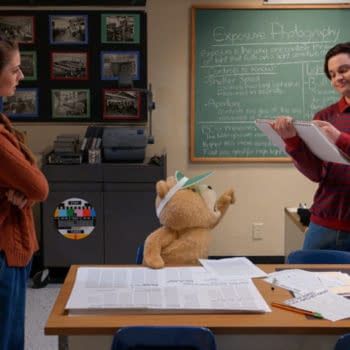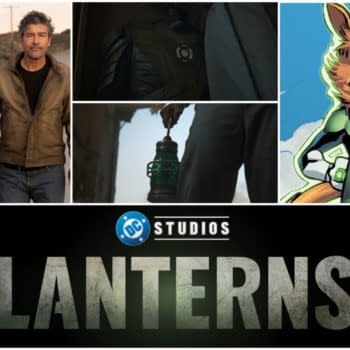Posted in: Movies, Video Games | Tagged: entertainment, film, Middle Earth: Shadow of Mordor, Monolith Games, Shadow of Mordor, the hobbit, The Lord of the Rings, video games
Shadow Of Mordor Review – Please Sir, Can I Have Some Mordor?
Patrick Dane writes for Bleeding Cool:
The Lord of the Rings has very depressing themes. It was written in the wake of J. R. R. Tolkien's time spent at the Somme during World War 1. While the stories of Hobbits, Wizards and Elves is easily consumable by all ages, there are a deeper undertones about the death and destruction of war. It was a story written by a mind plagued by his fallen comrades on the battlefield. You only have to reread the section where Sam, Frodo and Gollum are walking through the Dead Marshes to get a direct glimpse of this.
On the other hand, Monolith Games' Middle-Earth: Shadow of Mordor is a game about beheading Uruks and infiltrating their ranks as a powerful ranger-wraith, with no ultimate consequences to your obscene levels of power.
It is not hard to guess which one is better at parties.
Your journey starts with Talion. a Gondorian Ranger on the Black Gate. Through a rather brilliant tutorial, you'll be introduced to his family while the game teaches you its mechanics. It doesn't take long for things to go awry though as the gate is stormed by Sauron's army and Talion's family is sacaaficed in front of him. He himself also tastes the blade, but due to a blood ritual, he is banished from death, now spiritually linked to a mysterious elven wraith.
Sadly, the worst thing about Shadow of Mordor is the tale of revenge that ensues. Talion and the wraith you play as are serviceable characters, but their story is largely told through a collection of brief cut scenes. They are well acted, but they fall flat as the player is saddled with a sense of revenge for characters they only knew for a few minutes. The license also drags things down as the game can only go so far with this franchise. It tries to be a meaningful tale in the universe and at other times, it tries to hamstring how far it can go by making things smaller. There is something to be said about pacing, but Mordor can feel like it is dragging you between tones constantly. It means there is never really any chance for the player to connect with this journey on an emotional level. That is a big problem.
Luckily, just about everything else in the game is really good.
If you've played an Assassin's Creed game for more than twenty minutes, you'll have a decent grip on what Shadow of Mordor asks of you. You will spend a lot of time traversing scenery, stealth killing unsuspecting Uruks and upgrading your abilities. It's actually remarkable how closely the game feels to Assassin's Creed at times, which can be to its detriment. It shares the same annoyances that come with the parkour of that series. For example, you might find yourself running up a climbable wall three or four times before you grab hold. Other times you might take a few more steps then you intended too, causing you to jump into a horde of enemies by accident. On occasion, it can feel like traversal fights your intentions. That isn't to say that climbing scenery usually plauged by this, but it did happen enough to me for it to stick in my mind.
Where the game does improve on the Assassin's Creed dynamic though is in its combat. Shadow of Mordor takes cues from the Batman: Arkham series, encouraging the player to go on the offensive with melee attacks while also countering incoming hits. As you get more abilities, more options open up to you as you learn to stun, execute and control your enemies. The real hook here is that despite being able to dispatch large numbers of enemies at any one time, it can be easy to get overwhelmed. You always feel powerful, but never invincible. It keeps things tense.
This is a clever choice by Monolith because it often feeds into the best thing about the game, the Nemesis system. The conceit is simple. The political hierarchy of the Uruks is ever changing as they all clamber to become Warchiefs. Randomly generated Uruks try to get promoted by executing rivals and recruiting more followers. This comes into play for Talion because each of these Captains can be found in the open world, each with its own generated look, personality, skills and weaknesses. It personalises the neverending horde and the feature never ceases to impress with its diversity. Even getting struck down by any random NPC will promote him to a captain. This means, literally every NPC has the chance to become their own defined character. It is a pretty intoxicating system and makes the world feel alive. Who knows, maybe one day that faceless Uruk who got the killing blow on you might become a Warchief.
This is also given new life when you gain the ability to control your enemies, thus giving you a horse in the political race for Mordor as you raise up your own ugly minion to the upper echelons of Uruk society. The whole system is an engrossing narrative mechanic that leads to some interesting emergent storytelling.
One of the other aspects of this system that gives it resonance is that these enemies remember you. Last time you met, did you burn a captain who was scared of fire? Come riding in on the back of a four-legged Caragor? Did you run from a fight? Did they kill you? All these things are recalled as you begin a confrontation with a captain. It makes action meaningful with every death and victory feeling like it has a tangible affect on Mordor itself, even if under the hood, it really is just cosmetic.
The system actually gave me the most forward momentum I felt during the game too as the most compelling objectives were my own personal goals. For instance, after completing the main campaign, I set myself the challenge of killing every single captain and Warchief for no better reason than I could. The Nemesis system supports emergent narrative and it's a shame that that it's tethered to such a clunky linear story. It distances, rather than supports, the overall narrative.
That is not to say everything works with the Nemesis system as I have reservations about how it works in this franchise and story. Shadow of Mordor is about two characters trying to avenge their dead families. It feels disingenuous to the character's motives take control of an Uruk, guide him up the horde and bend the politics to their will. This creates a real sense of dissonance between the actions of the player and the morales of the character.
Middle-Earth: Shadow of Mordor is a pretty good game wrapped around a game changing mechanic. Great, original ideas can be hard to find in big budget games, so it is encouraging that Monolith chose to base so much of their gameplay on an experimental system like 'Nemesis'. Although this mechanic is so interesting, it only highlights the less inspired ideas that surround it. While Assassin's Creed and Arkham make great bed fellows, Mordor's play is noticeably borrowed from other games. The narrative is also distant from the players actions, making it hard to care about the story that's being told compared to the one the player is shaping for themselves within the Uruk ranks.
These ultimately end up feeling like gripes though, since in the end, the game is just a lot of fun to play. It has clever design and it is always satisfying to slice an orc's head off as it goes rolling across the ground. I had a great time decimating the Mordor ranks from within and I likely will continue to do so for a while longer. Hats off to Monolith for designing such a unique mechanic that will likely have an exciting future.
Patrick Dane, once a would be filmmaker, has somewhat accidentally found himself as an entertainment journalist over the past two years. You may recognize him from around these parts, or you may not. Who's counting? From E3 to SDCC to the Top Gear track, Patrick has explored the world of entertainment wherever it has taken him. He is always happy to talk words at you. Hopefully the ones above will suffice your needs.


![[Image 1]](https://mlpnk72yciwc.i.optimole.com/cqhiHLc.IIZS~2ef73/w:600/h:375/q:75/https://bleedingcool.com/wp-content/uploads/2014/10/Image-19.jpg)
![[Image 2]](https://mlpnk72yciwc.i.optimole.com/cqhiHLc.IIZS~2ef73/w:600/h:337/q:75/https://bleedingcool.com/wp-content/uploads/2014/10/Image-210.jpg)
![[Image 3]](https://mlpnk72yciwc.i.optimole.com/cqhiHLc.IIZS~2ef73/w:600/h:337/q:75/https://bleedingcool.com/wp-content/uploads/2014/10/Image-34.jpg)
![[Image 4]](https://mlpnk72yciwc.i.optimole.com/cqhiHLc.IIZS~2ef73/w:600/h:337/q:75/https://bleedingcool.com/wp-content/uploads/2014/10/Image-42.jpg)













